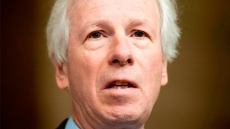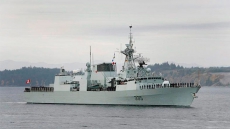OTTAWA — Canada's parliamentary budget officer was largely stonewalled in his efforts to put a price tag on the combat mission in Iraq, prompting the fiscal watchdog to call for changes to the law that governs his agency.
Jean-Denis Frechette's latest report, released Tuesday, says cost of the current combat mission against the Islamic State of Iraq and the Levant likely falls somewhere between $128 million and $166 million.
Should the mission be extended to 12 months, as expected, the cost would balloon to anywhere from $242.71 million to $351.27 million, the report says.
Frechette was forced to produce a range of dollar figures because the Department of National Defence imposed cabinet secrecy on cost estimates and barred PBO staff from briefings given to defence academics and insiders.
Budget office analysts compiled their figures using open-source data from previous missions, such as the Libya bombing campaign, and U.S. figures for ammunition.
The wide-ranging estimate was compiled at the request of opposition MPs after the Harper government refused to release its own figures — something Defence Minister Jason Kenney finally did Monday, with the PBO report looming.
Kenney pegged the cost of Canada's bombing campaign and special forces deployment at $122 million for the current budget year, which ends in March.
But since those numbers have yet to be tabled in Parliament, it's unclear how they were compiled, said Frechette.
Budget office officials accuse the government of practising "selective transparency," citing Monday's 11th-hour release of the government's own estimate — a move that Frechette admitted left him taken aback.
"I think it was bizarre timing," he said.
"In the morning, you know, the PBO very transparently announces we will publish our report today. All of a sudden, in the afternoon, the number was released by the department, by the minister. Good or bad timing, I don't know."
The budget office is normally entitled to see financial and economic data in order to compile its reports, but National Defence argued that the Iraq information, aside from being a cabinet secret, fell beyond the watchdog's mandate.
"You know, you have to be really narrow-minded, really strict in terms of your interpretation, if you want to always, always say that the data we're asking for is not economic or financial," Frechette said.
"That is why Parliament will have to look at it, and look at the legislation."
The speakers of both the House of Commons and the Senate are aware of the problem and have written to the joint committee overseeing the budget office asking for an investigation, he added.
Budget office staff also note that once information is declare a cabinet secret, it remains sealed for 20 years and the only way to challenge the decision is to go to court.





